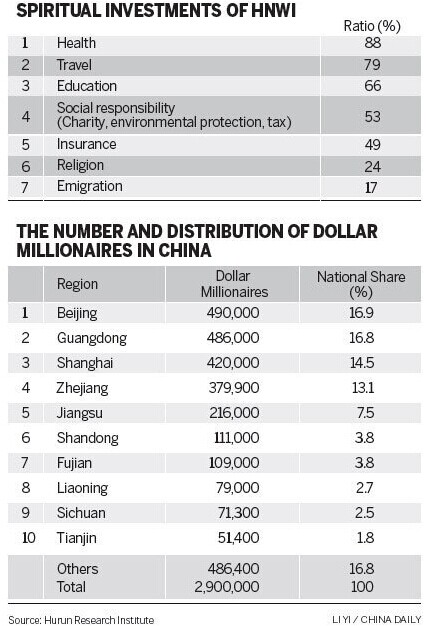

Survey finds that high net worth individuals' spending is different
The most affluent Chinese are more likely to care about "spiritual rewards" now that they are no longer worried about money, according to the China Spiritual Investments White Paper 2014 co-released by Industrial Bank Co Ltd and the Hurun Report on Tuesday.
The report defines spiritual investments as those that satisfy inner needs but don't necessarily have a direct financial return.
This category can also cover socially responsible investments as well as those in education, health, insurance and travel.
Health, travel and education are the three areas that attract the most spiritual investments from high net worth individuals with personal wealth of at least 6 million yuan ($959,735).
In the category of social responsibility, environmental protection is considered a higher priority than charity for 87 percent of the 1,019 wealthy individuals who were surveyed.
About 80 percent of the surveyed rich have annual physical exams, while 14 percent get one every six months. Jogging is the most popular sport, followed by badminton and swimming. The rich exercise three hours every week on average.
Liang Yaohui, 40, general manager of a Shanghai-based garment company, goes to the gym three times every week on average not only to keep fit but to "stay young and energetic".
He said: "Most of the time, I use the treadmill of the community club. When the weather is good, I will jog in the community. I also take my jogging shoes and swimming trunks when I am on a business trip. I can use the facility at the hotel for exercise. When you go the gym at 7 am, you will be surprised to see that it is mostly occupied by foreigners, most of whom are company executives. You will know then how important it is to work out," he said.
More than half of the surveyed Chinese rich went overseas at least once in 2013, spending an average of 64,000 yuan.
Reading is regarded as the best form of self-education for the super-affluent. On average, they read 10 hours every week, and the very richest among them read 15 hours per week.
The second most popular form of continuing education includes graduate programs in business, followed by attending exhibitions and participating in forums and seminars.
"Chinese millionaires are setting aside more time than I expected toward reading and learning, as well as exercise. Mental balance will help them withstand more stress," said Rupert Hoogewerf, chairman and chief researcher of the Hurun Report.
"High net worth individuals focus mainly on social responsibility and green finance when it comes to spiritual investment, both of which are the focuses of private banking.
"In this sense, having a better understanding of spiritual investment will help with the sustained development of private banking," said Xue Ruifeng, general manager of the private banking department at Industrial Bank.
As of the end of 2013, there were about 2.9 million high net worth individuals, up 3.6 percent year-on-year. Hurun has forecast their ranks will reach 3.35 million within three years.
Super-rich Chinese, defined as those with assets exceeding 100 million yuan, increased by 4 percent to reach 67,000.
Flying club for the rich in suburban Beijing
2014-04-18China’s super rich fleeing to avoid smog
2014-03-28China‘s tech gurus make rich list
2014-02-26Rich Chinese tourists looking to space
2014-01-13Tencent CEO tops Hurun IT Rich List
2013-09-24Copyright ©1999-2018
Chinanews.com. All rights reserved.
Reproduction in whole or in part without permission is prohibited.